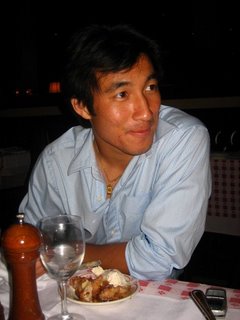Stephen Scott Review by the NY Times
This guy will be at Yoshi's performing with Ron Carter:
Review/Jazz; A Work In Progress At the Piano
The pianist Stephen Scott opened his set at the Village Vanguard on Tuesday night with his "Behind the Scenes," a tune that uses bits and pieces of a melody, and a riff, but never really states itself as a traditional song. Mr. Scott and his band opened the door on the improvisations, and Mr. Scott threw himself into a solo that flaunted a group of fractured chords, shards of sound, and glittering dissonances. The piece seemed to melt away; Mr. Scott let the balance between the tune's form and improvisation shift, with cascades of drumming overwhelming the piece's borders. Mr. Scott, 24 and immensily gifted, seemed almost impatient with the classicism of the mainstream.
The jazz renaissance of the last decade did away with the notion of difficult music in jazz, and "Behind the Scenes," which owed a bit to the more experimental side of Herbie Hancock and later Hampton Hawes (though Mr. Scott is much more referential than either of them), might have been considered abstract by an audience looking to hear the plain mainstream. Though Mr. Scott performed a standard or two -- Duke Ellington's "Solitude" and Wayne Shorter's "Infant Eyes" -- and though he and the band swung mightily, it was the sense of exploration, rife through every tune, that suggested that Mr. Scott is a work in progess.
The compositions forced Mr. Scott to work, changing tempos and dynamics. On "Pit or Pendulum," a solo piece, stop-time sections set up tempo changes; on other tunes, he and the band -- Dwayne Burno on bass and Carl Allen on drums -- turned down the volume to reach a sort of Basie-like quietude, with Mr. Scott's right hand dropping glassy single notes over the thrust of the rhythm section.
Mr. Scott takes his time between phrases: his improvisations, deliberate and subject to constant revision, are transparent in their logic. At times, silence spread out between notes as he mused about his next line. He imparts a sense of play, with idea after idea spilling out, quotes bumping into quotes. And his accents, shifting from note to note in a phrase, made everything he played seem new. Elongated, the improvisations felt fluid and most pliable.


0 Comments:
Post a Comment
<< Home